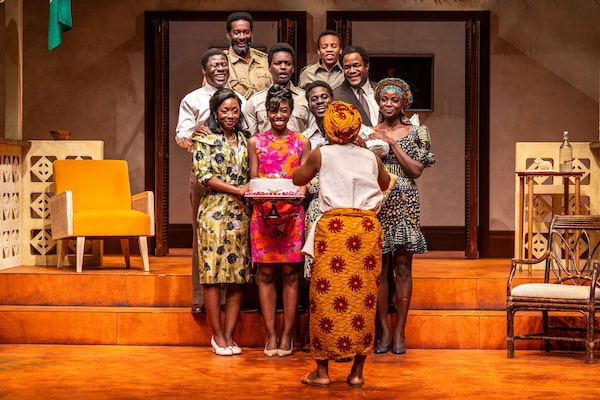
The three sisters cry together. Akosua Amo-Adem plays the eldest sister Lolo, Virgilia Griffith plays the middle sister Nne Chukwu and Makambe K. Simamba plays the little sister Udo.Soulpepper
- Title: Three Sisters
- Written by: Inua Ellams, after Anton Chekhov
- Director: Mumbi Tindyebwa Otu
- Actors: Akosua Amo-Adem, Virgilia Griffith, Makambe K Simamba, Oyin Oladejo
- Company: Soulpepper Theatre Company and Obsidian Theatre
- Venue: Young Centre for the Performing Arts
- City: Toronto, Ont.
- Year: Runs to March 24, 2024
Since its first memorable mounting of Platonov a quarter of a century ago, Soulpepper’s theatrical reputation in Toronto has owed much to the great casts it has assembled to bring the works of Anton Chekhov to life.
That tradition of top-notch tragicomedy continues with the company’s new co-production of Three Sisters with Obsidian Theatre.
Director Mumbi Tindyebwa Otu has put together a tight twelve-actor ensemble – including three actors giving powerful performances that are likely to be remembered for the next 25 years by those who see them.
They are Akosua Amo-Adem as Lolo, swallowing humiliation even as she radiates resilience; Virgilia Griffith as Nne Chukwu, trembling with heartbreak but never breaking; and Oyin Oladejo as Abosede, comedic one moment, chilling the next, strutting her way from victim to villain.
If you don’t recall those character names from your previous encounters with Chekhov, that’s because the version of Three Sisters currently being staged is an acclaimed adaptation by the Nigerian-born British playwright Inua Ellams (Barber Shop Chronicles) that premiered at the National Theatre of Great Britain in 2019.
Instead of taking place in a Russia teetering on the brink of revolution and war, Ellams’s version of Chekhov’s 1901 play begins in Nigeria right at the outbreak of that country’s civil war (also known as the Biafran War) in 1967 and the action carries through to its end in 1970.

The play begins on Udo’s birthday and the anniversary of their father’s death.Soulpepper
Olga, Masha and Irina are now Lolo (Amo-Adem), Nne Chukwu (Griffith) and Udo (Makambe K Simamba), Igbo sisters living in a village in their people’s traditional homeland in the southeast.
The three yearn not for Moscow, but for Lagos, a cosmopolitan city that their late father moved them away from after Nigeria gained independence in 1960, anticipating that there could be conflict between different ethnic groups.
Indeed, as the play begins on Udo’s birthday and the anniversary of their father’s death, violence has already begun between the Hausa, the Yoruba and the Igbo, the three main civilizations that had been arbitrarily yoked together in one country under British colonial rule.
A pair of coups have taken place, massacres have followed and Igbo military leader Chukwuemeka Ojukwu is preparing to declare the independence of the Republic of Biafra.
An impressive accomplishment of Ellams’s adaptation is how quickly and effectively he explains the politics of the time without exposition – and how easily all this Nigerian history sits on the familiar scaffolding of Chekhov’s original play in the first two acts.
The downwardly mobile three sisters and their hapless brother, in particular, are very recognizable from the source material in their emotions – the hope, the disappointment, the passion, the delusion.
Lolo is the unmarried oldest, a sexism-stifled schoolteacher who puts her needs second as she plays mother to her parentless sisters.
Nne Chukwu, the middle child married to a bland schoolteacher (a terrific Tawiah M’Carthy) from a young age, is an unhappy romantic who falls quickly for the soulful and strange soldier Ikemba (Daren A Herbert), himself married with two daughters.
Udo, meanwhile, is the lively youngest – pursued by a pair of young soldiers (Ngabo Nabea and Amaka Umeh), but more interested in finding her purpose in life than a husband.

An impressive accomplishment of Ellams’s adaptation is how quickly and effectively he explains the politics of the time without exposition.Soulpepper
Then there’s Dimgba (Tony Ofori), the sisters’ over-educated but unserious brother, who courts and proposes marriage to Abosede (Oyin Oladejo), a Yoruba woman whose fashion sense and relative lack of education make her the subject of condescending looks and the butt of unkind jokes in the first act.
But Abosede gets her revenge – oh, how she gets her revenge. (And, oh, how Oladejo is almost certainly going to get a Dora Award for her hilarious and hair-raising performance in high heels).
While Chekhov’s plays are associated with the advent of realism in theatre, Canadian productions tend to involve psychologically realistic acting within an aesthetic of placelessness.
So, it does take some time to wrap one’s mind around a Three Sisters so clearly rooted in a specific time and place. Especially so when the violence from what’s described in the program as “arguably one of the bloodiest conflicts in Africa’s history” starts to literally bleed into the story.
Where Three Sisters never fully landed for me was in the restrictively realistic set design by Johanna Yu; three of the four acts take place in the courtyard of the family house – and that meant the physical movement was often confined to a few feet downstage. Otu’s production got very monotonous from a staging point of view.
The one scene where the set opened up to reveal a vast interior – and the characters had space for their little comedies and dramas to play out by desks or pianos or in hallways – was by far the most engrossing and vivid.
But I eventually did wrap my mind around the overall concept, the play on top of the play, with many poetic and pertinent things to say about neo-colonialism as well as the human condition.
The slow burn of Otu’s production – and it is a slow burn at three and half hours – paid off as it led up to a succession of deeply moving, brilliantly acted moments in its final minutes that I won’t soon forget.